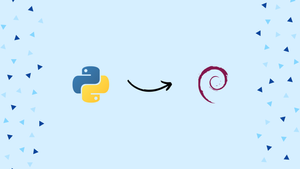Choose a different version or distribution
Introduction
Before we begin talking about how to install Python 3.11 on Debian 11, let's briefly understand – What is Python?
Regardless of your level of programming experience, you must be familiar with Python. One of the most well-liked programming languages is Python. It is a free, open-source language that may be used by novices as well as corporations.
This language is extremely versatile since developers utilize it to create a wide range of applications. Everything is available in this programming language, from web apps to machine learning methods.
The latest release of Python, version 3.11, was just released. This new edition had a lot of new features. New str functions, dict operators, support for the IANA time zone, and many more features are among the new additions.
In this tutorial, you will install Python 3.11 on Debian 11. We will also address a few FAQs on how to install Python 3.11 on Debian 11.
Advantages of Python
- Simplicity: Python's clean syntax and easy-to-read code make it beginner-friendly.
- Versatility: Python can be used for web development, data analysis, machine learning, and more.
- Large Community: Its vast user base ensures access to extensive libraries, frameworks, and support resources.
- Integration: Python seamlessly integrates with other languages and platforms.
- Scalability: Python's performance and scalability make it suitable for projects of any size or complexity.
Installing Python 3.11 in Debian 11
Updating the apt cache index is the first step in installing Python 3.11 in our Debian 11 system. To accomplish this, issue the below given command:
sudo apt update
Type the following command if there are any packages that need to be upgraded:
sudo apt upgrade
However, as you can see, all the packages in my instance are up to current, so it wasn't necessary.
We've upgraded our system successfully; let's restart it with the following command:
sudo reboot
The process of installing Python 3.11 will now be initiated. We need to install the dependent packages in order to achieve this. Use the command as follows:
sudo apt install wget software-properties-common build-essential libnss3-dev zlib1g-dev libgdbm-dev libncurses5-dev libssl-dev libffi-dev libreadline-dev libsqlite3-dev libbz2-dev
The following step is to go to the official Python website and download version 3.11 from there. It can be found through the subsequent link:
https://www.python.org/downloads/
After that, enter the following command while changing the version:
wget https://www.python.org/ftp/python/3.11.4/Python-3.11.4.tgz
After that, we have to extract the downloaded file. It can be extracted using the command below:
tar xvf Python-3.11.4.tgz
Let's switch to the working directory after the downloaded file has been successfully extracted. It's for making a Python folder. First, we use the command below to change the directory:
cd Python-3.11.4
We shall then execute the configuration command. In order to accomplish this, enter the following command into your terminal:
./configure --enable-optimizations
The Python build procedure will now be started as the following step. In order to accomplish this, enter the following command into your Terminal:
sudo make altinstall
After running the above-mentioned command, your output should appear as follows if Python was successfully installed:
At the end of the output from that previous command, you will see the following message:
Type the next command to check the installation:
python3.11 --version
The following link allows us to install the Python modules as well:
https://pypi.org/
Click the aforementioned link, then use the following command to install any desired modules:
python3.11 -m pip install <moduleName>
Since everything is finished now, let's just use Python 3.11. The following command should be used to use the Python 3.11 shell:
python3.11
We will now create our first Python 3.11 program in Debian 11. Everyone is aware of the first program a programmer ever wrote, which printed "Hello World." Just print "hello world" for now. Fill in the following:
>>> print("Hello World!")
Type the following command to end or quit the Python shell session:
>>> exit()
FAQs to Install Python 3.11 on Debian 11
Can I have multiple Python versions on Debian 11?
Yes, you can have multiple Python versions installed on Debian 11. Use update-alternatives to manage different versions.
How can I check the installed Python version?
Type python3 -V in the terminal to check the default Python version. For Python 3.11, it should display "Python 3.11.x".
Are there any prerequisites for installing Python 3.11 on Debian 11?
No specific prerequisites are needed. However, make sure your system is up to date before installing Python.
Can I install Python 2.x alongside Python 3.11?
By default, Debian 11 doesn't come with Python 2.x. However, you may install it separately using apt if required.
How do I update my existing Python installation to version 3.11?
You can't directly update your Python installation to a newer version through package management. It's recommended to install the newer version alongside the existing one.
Can I use alternative methods to install Python 3.11?
Yes, apart from package managers, you can also build Python from source or use tools like pyenv to install and manage different versions.
Are Python packages and libraries compatible with Python 3.11?
Most Python packages and libraries are compatible with Python 3.11. However, it's recommended to verify compatibility before updating.
Conclusion
One of the most well-known languages in computer science is Python. Every developer has worked in this language at some point. Rightfully so! Because it provides a vast array of areas. In this language, we may create both Web applications and machine learning algorithms.
To install Python 3.11 on Debian 11, we've walked you through each and every step, including examples. We even ran a basic hello world program in Python 3.11 shell as an example to get you started.
If you have any queries, please leave a comment below, and we’ll be happy to respond to them.


